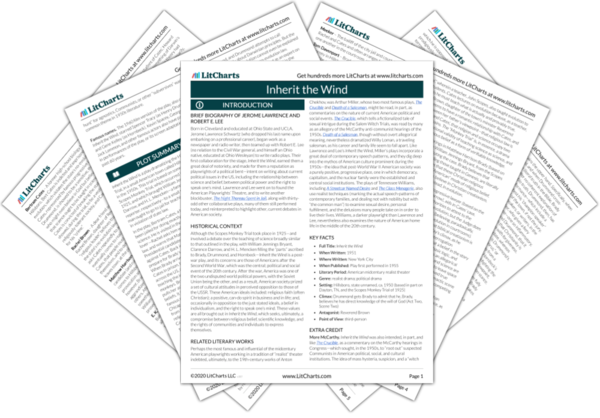Welcome to the LitCharts study guide on Jerome Lawrence and Robert E. Lee's Inherit the Wind. Created by the original team behind SparkNotes, LitCharts are the world's best literature guides.
Inherit the Wind: Introduction
Inherit the Wind: Plot Summary
Inherit the Wind: Detailed Summary & Analysis
Inherit the Wind: Themes
Inherit the Wind: Quotes
Inherit the Wind: Characters
Inherit the Wind: Symbols
Inherit the Wind: Theme Wheel
Brief Biography of Jerome Lawrence and Robert E. Lee

Historical Context of Inherit the Wind
Other Books Related to Inherit the Wind
Key Facts about Inherit the Wind
- Full Title: Inherit the Wind
- When Written: 1951
- Where Written: New York City
- When Published: Play first performed in 1955
- Literary Period: American midcentury realist theater
- Genre: realist drama; political drama
- Setting: Hillsboro, state unnamed, ca. 1950 (based in part on Dayton, TN, and the Scopes Monkey Trial of 1925)
- Climax: Drummond gets Brady to admit that he, Brady, believes he has direct knowledge of the will of God (Act Two, Scene Two)
- Antagonist: Reverend Brown
- Point of View: third-person
Extra Credit for Inherit the Wind
More McCarthy. Inherit the Wind was also intended, in part, and like The Crucible, as a commentary on the McCarthy hearings in Congress—which sought, in the 1950s, to “root out” suspected Communists in American political, social, and cultural institutions. The idea of mass hysteria, suspicion, and a “witch hunt” for agnostics, Communists, or other “subversives” was a common theme in 1950s literature.
Famous names. The 1960 film version of the play, also called Inherit the Wind, starred Spencer Tracy (as Henry Drummond) and Gene Kelley (as Hornbeck). Kevin Spacey, George C. Scott, Jack Lemmon, and other famous actors also have participated in performances of the play, or its screen adaptations, over the past 60 years.







